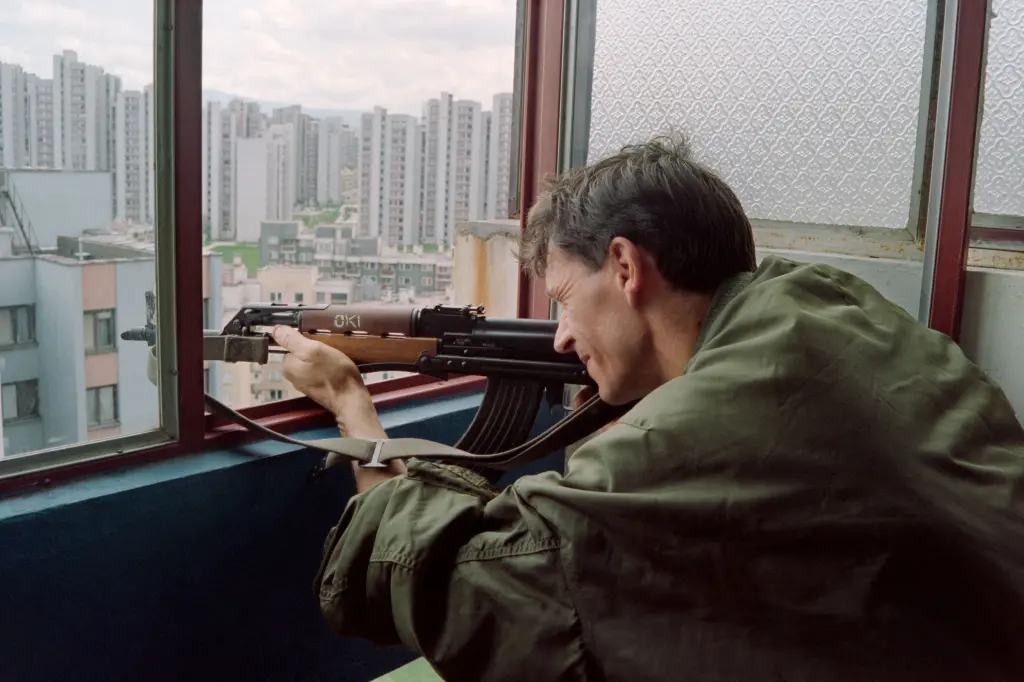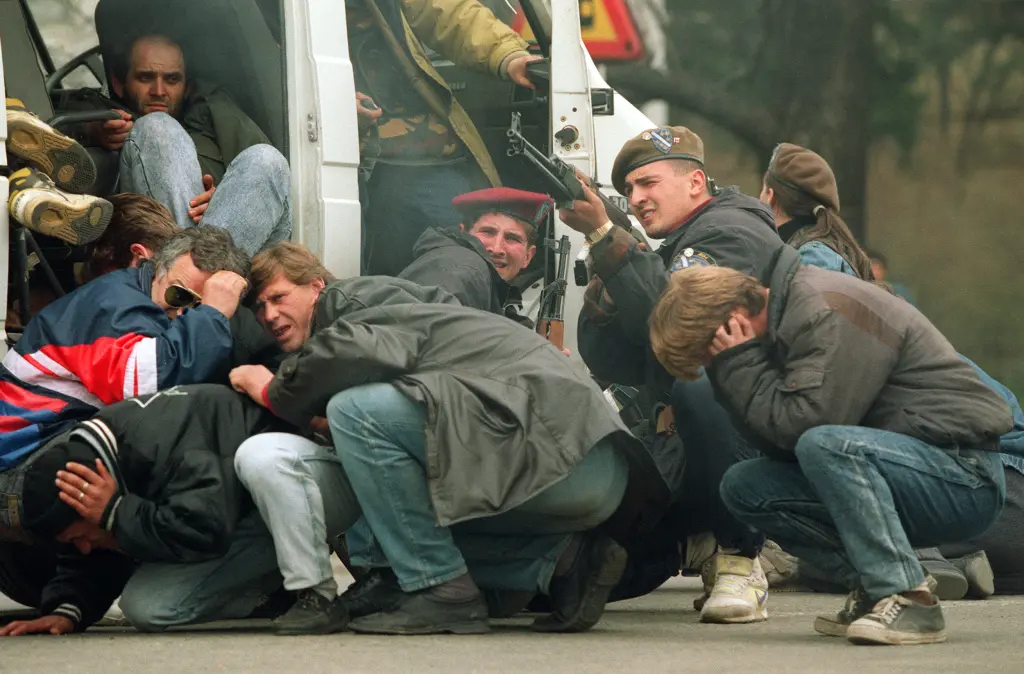Italian prosecutors probe claims that wealthy foreigners paid $90,000 to shoot civilians — including children — during “human safari” trips to Sarajevo’s war zone
In the shattered streets of Sarajevo, where bullet holes still pockmark walls and memorials line sidewalks, a horrifying new chapter from the city’s wartime past has resurfaced. Italian prosecutors have opened an investigation into allegations that, during the Bosnian War in the 1990s, wealthy foreigners paid tens of thousands of dollars to participate in so-called “human safaris,” where civilians — including children — were used as living targets.

The claims first emerged in a 2022 documentary titled Sarajevo Safari, directed by Slovenian filmmaker Miran Zupanič. The film featured testimony suggesting that rich “sniper tourists” paid Bosnian Serb forces to experience the thrill of shooting at civilians from the hills encircling the city during the siege of Sarajevo, one of the darkest episodes of the 20th century. Now, Italian authorities have taken those claims seriously. Prosecutors in Milan confirmed they are pursuing an inquiry into whether Italian nationals were among those who traveled to Bosnia during the war, paying up to $90,000 for what witnesses described as “a perverse form of entertainment.”
The investigation reportedly began after Italian journalist and author Ezio Gavazzeni presented new evidence to prosecutors. Working with retired judge Guido Salvini and former Sarajevo mayor Benjamina Karić, Gavazzeni compiled testimonies, travel records, and intelligence documents hinting at organized trips for wealthy “clients” during the 1992–1996 siege. According to their submission, these individuals — allegedly from Italy, France, and other European countries — were escorted by members of the Bosnian Serb army to sniper positions overlooking the city. There, for the right price, they were allowed to aim and shoot at civilians below.
In one of the most chilling details, reports claim there was even a “price list” — with higher fees to shoot children or women. Witnesses quoted in Sarajevo Safari described the experience as a grotesque convergence of wealth, power, and cruelty: “They treated it like a sport,” one survivor said. “They wanted to feel what it was like to take a life.”

During the siege of Sarajevo, the longest in modern European history, more than 10,000 civilians were killed. For nearly four years, residents endured constant shelling and sniper attacks from the hills controlled by Bosnian Serb forces. The main thoroughfare, nicknamed “Sniper Alley,” became infamous as one of the deadliest stretches of road in the world. Civilians crossing open streets risked being picked off by snipers stationed in surrounding high-rises. It was a daily reality of fear and survival, as mothers ran carrying children through alleyways, and elderly men waited for dark clouds to obscure sniper visibility before stepping outside.
That horror, it now appears, may have been commodified. Prosecutors in Milan are exploring whether the alleged sniper safaris were arranged through intermediaries — possibly with connections in Belgrade or northern Italy — and facilitated by corrupt military officers seeking money. Intelligence sources cited by Italian media allege that some participants flew from Milan to Belgrade, then crossed into Bosnian Serb-held territory with help from paramilitary groups. Once there, they were reportedly given weapons, ammunition, and escorted to “designated shooting zones.”
The allegations, if verified, would represent one of the most disturbing examples of war crimes tourism ever recorded — where human suffering was sold as leisure. So far, prosecutors have declined to name suspects, but Italian press reports suggest that at least one Milan-based businessman is under preliminary investigation. According to La Repubblica, investigators are examining financial transactions, travel logs, and testimony from former Italian intelligence officers who claim they warned authorities about the phenomenon as early as 1993.
Survivors of the siege have reacted with shock and disgust to the revelations. “We always knew the Serb snipers were shooting for pleasure,” said one woman who lost her brother near the Holiday Inn hotel, a hotspot for sniper fire. “But to learn that foreigners paid money for it — that’s beyond monstrous. That’s not war; that’s evil.”
In Sarajevo, the investigation has reawakened the trauma of those years. The city still bears physical and emotional scars from the siege — buildings marked by bullet holes, streets named after victims, and a generation that grew up under the constant sound of gunfire. Local leaders have welcomed the Italian probe, calling it a long-overdue step toward justice. “If these allegations are proven, it will show that Sarajevo was not only a victim of aggression but also of human depravity without borders,” said Benjamina Karić, now a prominent advocate for war memory preservation.
The Bosnian government has pledged full cooperation with Italy’s judiciary. Officials from the State Investigation and Protection Agency (SIPA) have reportedly shared archival materials and witness lists. The Bosnian Prosecutor’s Office said in a statement that “any information about foreign nationals participating in war crimes will be pursued to the fullest extent.”
Still, skepticism remains. War historians and legal experts caution that proving the sniper-tourism allegations will be extremely difficult three decades after the conflict. The fog of war obscured record-keeping, and many perpetrators are dead or untraceable. “We are dealing with rumors that may mix truth with propaganda,” said one former UN war crimes investigator. “But even investigating the possibility is important — because silence is the accomplice of atrocity.”
The Serbian government and veterans of the Army of Republika Srpska have dismissed the claims as “absurd fabrications.” A spokesman for a Serb veterans’ association told reporters, “Our soldiers fought to defend their people. There were no tourists. This is an attempt to smear the Serb nation.” However, human rights observers counter that similar denials have surrounded other war crimes until evidence later proved otherwise.
International reaction has been one of outrage and disbelief. Human Rights Watch called the reports “horrific but plausible,” noting that the Bosnian War featured widespread mercenary involvement and profiteering. The UN High Commissioner for Human Rights urged cooperation between Italy and Bosnia to “ensure accountability for any act that commodified human life.”
Beyond the legal implications, the story carries an unsettling moral weight. It exposes the extremes of human cruelty, where war’s chaos became a playground for the privileged. The idea that a person could buy access to suffering — to pay for the right to pull a trigger on an unarmed civilian — is almost unthinkable, yet echoes of such acts have surfaced in other conflicts. In Iraq and Syria, reports emerged of foreign fighters paying militias for “combat experiences.” In Sarajevo, that dark fantasy may have found its first expression.
As Milan prosecutors continue their work, the world watches with a mix of horror and hope — horror at the depravity that may be confirmed, and hope that justice, even delayed, can still speak for those who never got to run, hide, or survive.
In the quiet suburbs of Sarajevo today, where children play beneath apartment windows once shattered by sniper fire, the city’s resilience is palpable. But so is its memory. “We rebuilt our streets,” said a survivor in an interview this week. “Now, maybe, we can rebuild the truth.”

